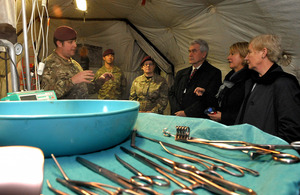Hospital leaders get taste of military medicine
Airborne medics have shown senior NHS staff the unique capabilities they provide to the Army.

Staff Sergeant Dean Cullen briefs Sir John Ashworth, Julie Firth and Dr Sally Irvine on the operational skills and working environment of military medics [Picture: Corporal Gabriel Moreno, Crown Copyright/MOD 2012]
16 Medical Regiment has a close relationship with Colchester Hospital University NHS Foundation Trust, with soldiers carrying out work placements and training at the Trust’s hospitals.
A delegation from the Trust, including its chair, Dr Sally Irvine, recently visited Colchester’s Merville Barracks to get an insight into the operational skills and working environment of military medics.
16 Medical Regiment provides the Airborne Surgical Group (ABSG) to 16 Air Assault Brigade, which maintains a force ready to deploy anywhere in the world at short notice to do anything from disaster relief to war-fighting.
The ABSG provides accident and emergency, X-ray, surgical and intensive treatment facilities and is manned by anaesthetists, surgeons and other specialist medics, many of whom are parachute-qualified.
It can also deploy with a primary healthcare node, which includes a GP and dentist.
Lieutenant Colonel Steven Tracey, Commanding Officer of 16 Medical Regiment, said:
We enjoy an excellent relationship with the Trust, which is of mutual benefit. Through clinical placements at Colchester hospitals our men and women are able to keep their skills sharp and stay up to date with NHS best practice while sharing their operational experience with hospital staff.

Staff Sergeant Dean Cullen briefs Sir John Ashworth, Julie Firth and Dr Sally Irvine on the operational skills and working environment of military medics [Picture: Corporal Gabriel Moreno, Crown Copyright/MOD 2012]
From recent deployments to Afghanistan and preparing for the rapid response role, our medics are trained and experienced at operating - in all senses of the word - in austere and hostile conditions.
I hope that showing the Trust the facilities we are used to will give a better idea of the skills and quality of the soldiers working at their hospitals.
Dr Irvine said:
The Trust and the Garrison are probably the two biggest employers in Colchester and we - and our patients - both benefit from the close working relationship we continue to enjoy.
The Trust has developed a number of collaborative arrangements to provide services to soldiers and their families and to integrate garrison medical staff into service provision at our organisation.
The Trust delegation also visited the barrack’s medical facilities, which include a reception station with a 10-bed ward, dental surgery and primary healthcare facilities, the Regional Rehabilitation Unit, which provides physiotherapy and rehabilitation courses to help soldiers overcome injuries, and the regional headquarters of the Army Primary Healthcare Service.
The visit also took in Chavasse VC House which gives wounded, injured and sick soldiers additional care and support to help them successfully return to duties or transition into civilian life.